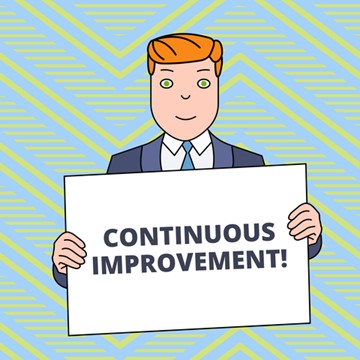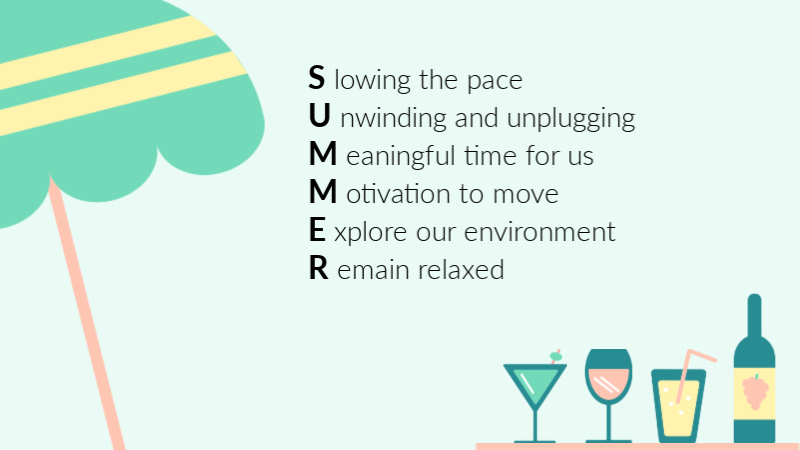The Fresh Start of a New Year
 These last few weeks can be labelled as busy, chaotic, and exhausting and I’m not even talking about work! I’m talking about the holiday time off that just passed! While I am glad to be back at work, it’ s tough to get back into the routine again. On that note, I hope you have all had a wonderful, stress-free holiday. For those that are perhaps not feeling the back to work grind, I offer the information below.
These last few weeks can be labelled as busy, chaotic, and exhausting and I’m not even talking about work! I’m talking about the holiday time off that just passed! While I am glad to be back at work, it’ s tough to get back into the routine again. On that note, I hope you have all had a wonderful, stress-free holiday. For those that are perhaps not feeling the back to work grind, I offer the information below.
Whether you had a relaxing time off, or you still need a vacation from your vacation, the transition back to the day-to-day routine of work, without the distraction, food and fun of the holidays is no easy task. So, first thing’s first: don’t be too hard on yourself, we’re all a little rusty getting back into the swing of things.
At times people may experience depression, the “winter blues” and anxiety. With winter settling in and the excitement of the holidays over, we push ourselves back to work and may not always recognize when it is time to take care of ourselves.
Don’t forget if you do need help right away the Canadian Mental Health Association has resources available.
A couple of years ago CBC posted an article on the anxiety of returning to work after the holidays and what you can do to manage it.
The signs of the “Winter Blahs” can include:
- Lack of motivation and loss of interest;
- Low energy;
- Difficulty sleeping; and
- Difficulty concentrating
However, there are a few ways to manage this form of depression that tends to linger during the winter months, so why not give some of these a try!
- LIGHT THERAPY:Use of an artificial light source, as light therapy to create the sunlight you would otherwise get during the summer months.
- SMALL ACCOMPLISHMENTS:Boost your motivation by completing small manageable tasks, recognizing each task as an accomplishment and step to a larger goal.
- HEALTHY EATING:Foods that contain the minerals and nutrients to get you through your day not only impact your physical health but can also be beneficial to mental health.
- STAY ACTIVE: (my personal favourite) Being active for 30 minutes per day is known to provide a fantastic boost of energy, confidence and provide an overall improvement to one’s mental and physical well being.
- EMBRACE THE COLD:As the winter is tucking itself in for a little while, there is no getting away from it and we may as well embrace it by getting out there and enjoying what it has to offer, such as skiing, snowshoeing, skating and even bundling up for that walk on your own or bring a friend.
So, what about getting used to that routine again? Even if you aren’t feeling the blues, maybe you are feeling the difficulty of getting back to the routine, so give a try with:
- Don’t set yourself up for negativity! – “Be the positive change you need.” I know it sounds a little strange, but taking a positive attitude to go back to work can be an excellent start to going back to work.
- Be ready for the pile of work and chunk it out into steps – sure you have been away from the office for a little while, so you might want to anticipate the pile of work that may be waiting for you.
Slow and steady wins the race:
- Step 1: Make that coffee have a seat
- Step 2: Make a list of the things that need to be completed
- Step 3: Then chip away at it, one thing at a time
- Be patient with yourself.
Bring something to work or do something nice for yourself and ease back into it. Remember it is a new year, so this can be a fresh start to fantastic things to look ahead and look forward to.
You can do it! Wishing you everything wonderful for 2023 from Barbara B. and the team at VWI.
Masters As Teachers

Many organizations start with a great idea that will change the world and, through time and effort, they will evolve to be the best in their field. Though you might not think of it these terms, but what they’re doing, what they’re actually reaching for, is “mastery”.
You know this, because you have steered your non-profit through adversity and success, put in the hours of work, training, research, and sweat to make a difference. I don’t have to tell you that becoming the ‘master of business’ requires hard work. Malcom Gladwell would tell you that it takes 10,000 hours of “deliberate practice” to master a skill.
Imagine watching the best Formula One driver, or the most incredible ballerina. They make their chosen trade look so easy and accessible. It is only when you attempt to duplicate the complex beauty of the Dance of Sugar Plum Fairy (reported to be one of the most difficult roles to dance) or harness 1000 horsepower around a turn pulling 3 G’s in a Formula-1 car, you realize that just because something looks easy doesn’t mean it is.
And that may be true for something like ballet or the violin where the skill is quantifiable. Becoming a master of your non-profit or association is much more than “time in” on any endeavour.
As I look around there are any number of organizations providing services to their members, value to their donors, exposure to their sponsors in any number of ways. What separates the successful from those who have become a master at their industry is a gritty combination of discipline, hard work, humility and generosity. Most of us would agree with the first three, but generosity?
There’s an old adage, “if you want to learn something well, teach it to someone else”. In order to teach well, it requires that you face your presuppositions about things, unearth those ideas that you didn’t even realize you believe. Being the master of any subject (even one that you invented) requires you to be able to objectively look at whatever you’re doing and seeing ways it can be improved. To teach someone else what you know requires a certain generosity. After so many years of ‘doing you’, that can be difficult, but that generosity has the reward of unearthing flaws in your system in order to improve them, and you cannot master what you think is perfect.
Now expanding on the generosity of teaching and of talent development, you gain the opportunity to:
- Invest: You are investing time leading to growth as an organization and investing in another person. How great is that?! Can you imagine if Bill Gates just did it all himself without bringing in a team? Bringing in others to be a part of your team grows your organization and its mandate.
2. Discover Improvements: By letting others in on your system of doing things and teaching them how to do what you do they may discover and share new ideas and improvements you had not initially thought of. (another ‘set of eyes’ is always a good thing)
3. Trust and Grow: By trusting your team to deliver, instead of always just yourself, you free up time to do more and expand.
So while you’re changing the world, be generous, develop your talent base and grow!
Finding The Confidence to Speak

Being invited to speak at an in person or virtual event can be a wonderful honour given to the potential speaker by those who want to hear the speaker’s message and share it with others. However, for some, it can be a great cause of anxiety and fear, with the thought that all those eyes will be on them and focused on everything that’s said.
The ability to be a good speaker doesn’t always go hand in hand with the ability to do it easily. It takes practice. I have spoken with many who are fantastic speakers, but they are extremely nervous before hand to the point of being physically ill. Just remember, if you are in this group of uneasy speakers, you’re not alone! So, then what? What can be done to make this easier, or at least get you through it?
Keep these few things in mind when getting ready to speak to a group when you may be feeling less than confident:
Your audience is there because they want to be: For the most part, people attending a conference, meeting or lecture are there because they chose to be there, they want to hear your message and will be supportive of your efforts. Attendees tend to not be judgmental, are not making snap decisions about you based on your haircut, clothes etc. and are there to hear what you have to say, even if they’re there not by choice (perhaps they have been instructed to go by their boss), these attendees, will most likely just listen politely.
Change your worry to excitement: This is a tough one because you’re so focused on the negative aspects of what you think may happen. What if you switched your thought process and redirected it to excitement at the possibilities of doing a great job? Go into it with a positive outlook and understand that even if it doesn’t go the way you want, you still did it! You would have accomplished a major step in your own personal development and that’s awesome!
Practice and prepare: Practicing the presentation before hand helps a lot. Try getting a small audience together or even just practice by yourself. Give yourself a few days in advance to do this. Go through and read your presentation, re-write if you have to and make a few speaking notes for yourself as a guide. By taking these steps to practice and prepare, you’ll be more familiar with the material, therefore making it easier to engage in a conversational type of presentation and making eye contact with your audience, instead of looking at your notes. Another great place to practice amongst a supportive group would be to contact your local Toastmaster’s group.
Know the environment: If you’re in-person, make yourself familiar with the presentation venue and environment so you’re more comfortable before speaking. Arrive ahead of time, sit in various places in the room for a few minutes to get different visual perspectives and get settled in. Own the space.
Interact with your audience: If you’re worried about the audience getting bored, make sure to leave room for people to ask questions. Listening to their questions can give you a little break as well to take a drink of water and re-group as needed. This can also help you gain some extra time on your presentation if it seems to be too short. Remember to be welcoming of questions and stay calm.
Take care of yourself: Get plenty of rest, eat well and taking the time to pamper yourself a little before the presentation day provides a little extra boost and don’t forget to give yourself a little time to use the restroom before the presentation. Make sure you have some water by your side to take sips to avoid a dry mouth while speaking. If possible, make sure you’re already standing up a few minutes before the presentation, so you don’t have to maneuver around obstacles to get to your place.
Are you in the audience? Perhaps you are reading this and are not a speaker, but frequently attend presentations. Why not do what you can to make the speaker feel confident and perhaps let them know what you enjoyed in their presentation? We’re all in this together. No matter the size of the group you are speaking to, you can do it and there are people in your audience that are in your corner. Be excited for this opportunity – you’ll do great!
The Power of Time

“What would you do if you knew you could not fail?” – Anthony Robbins
“What lies behind us and what lies before us are tiny matters compared to what lies within us.” – Ralph Waldo Emerson
These two great quotes are making the same point while coming from different directions; the authors are saying that our lives are in our own hands and that we should look at all the parts of our lives honestly and make conscious choices confidently so that we may benefit.
We have the power to change our lives by using what we already have inside ourselves: Tony Robbins knows that lack of self-confidence often holds us back; Ralph Waldo Emerson shows us that it’s what’s inside of us that counts more than the past and the future.
Even though they haven’t written books called “Time Management”, these authors teach us a lot about successful time management and successful life management.
The past 19 months have taught us that time can stand still, expand to fill how long it takes a task to be done, stretch out endlessly before us or reduce itself so small that there simply isn’t enough of it. Yet, we all still have 24 hours in a day.
Another great quote is from David Allen, author of “Getting Things Done” and “Ready for Anything”. He gets right to the point when he says, “Time is just time, you can’t mismanage it. What that really means is that you mismanaged the agreement you had with yourself about what you should have accomplished.” He goes on to say that time management is really a complex issue of self-management where work needs to be captured, clarified, organized and reviewed in line with your purpose, values, vision, goals, and strategies. When these things are in line, you’ll feel good about how you’re managing time.
It’s really that simple.
TIME OUT!

Now that summer is here, some of us may head off to the beach or a cottage, some may be working in the heat of summer, while still others may be getting comfortable near a fan. As noted in the acrostic above, summer is an opportunity for us to do a few things to keep ourselves calm and relaxed as we unwind this summer. And let’s face it, we deserve it after the year we’ve had!
Slowing the pace
By taking the time to stop what we’re doing, or interrupt the daily cycle to listen, take a breath and live in the moment, even for just a minute, we can gain tremendous benefits such as lowering stress levels, lowering our heart rate and improving our mood and psychological engagement. Lifehack.com has a list of ways to slow down in a fast-paced world.
Unwinding and unplugging
Try going a day (or longer) with no technology, explore the magic of un-plugging. That means no phone, no television, no media of any kind. Instead, why not try taking a relaxing bath, read a good book (preferably made of an ancient fiber called ‘paper’), playing music or painting, or any other activity one would consider “old school”. By taking note of how you feel at the end of the day or more with no technology and note if you had an unwound day without it. Getting in touch with some of the old ways of doing things can make a difference in one’s day and it can actually help you feel mentally refreshed. A colleague mentioned when she needs to unwind, she bakes some bread but doesn’t use machines to make it. Just a bowl, spoon and her two hands. She swears by it as a stress reliever. Personally, I knit dog sweaters throughout the year – it’s very meditative and I find I process information and solve problems while the needles are clicking away…
Meaningful time for us
Don’t feel guilty about taking some much-needed quality or meaningful time out just for you. How we define that time may be different for everyone. Perhaps it means to be alone to collect your thoughts without interruption, or it may mean making time for family and friends. Just remember to not feel guilty about taking that time back but if you need some convincing on why it is important to take the time for yourself, Psychology Today runs through a few reasons to not feel guilty about solitary time for you and Time.com talks about the importance of meaningful time with those around us (socially distanced, of course).
Motivation to move
So far, we have talked about slowing down, unplugging, unwinding and taking time for ourselves. This all sounds pretty relaxing, but what about the importance of getting up and moving? While this almost feels counter-intuitive to the strategy of relaxing, exercise can make that relaxation all the more impactful by adjusting our body chemistry to reduce stress and boost mood, allowing us to better make use of our previously discussed methods for relaxation, as mentioned in Harvard Health. Alternatively, if the heat has got you down, taking a dip in the nearest pool or lake is another great way to stay in shape.
Explore our environment
While you’re getting up to exercise, why not take it outside. It’s summer after all! This gives you a wonderful opportunity to mindfully take in nature within your neighbourhood, or local trails. In our busy days, we don’t always get to take in the beauty of our environment.
Remain relaxed
Finally, some days just feel like chaos rests at the top of our minds. This is the perfect chance to try some meditation exercises (check out the ‘Calm’ app) to quiet the chaos, reduce stress and bring us back to that place where we can once again enjoy a slower pace by unwinding and making our summer a meaningful one.
Have a wonderful summer everyone!

Recent Comments